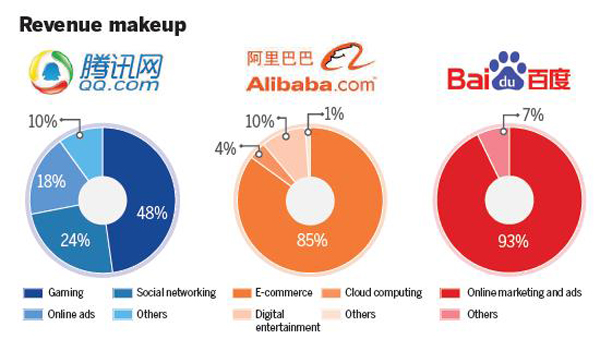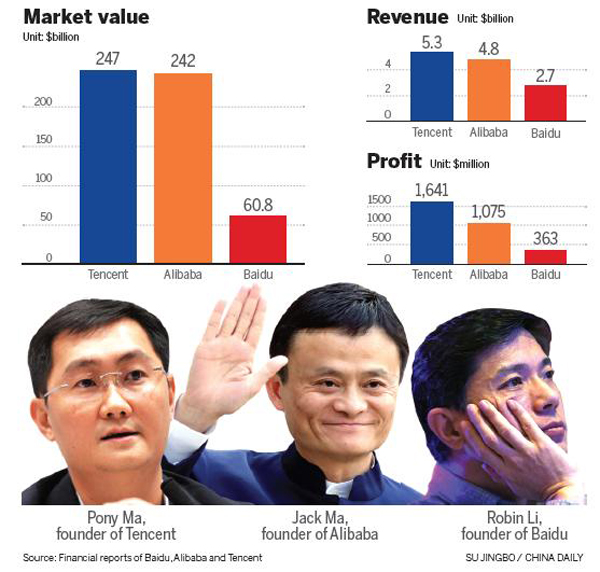Analysts say Baidu must diversify further
By MA SI (China Daily) Updated: 2016-08-23 07:30

Baidu Inc needs to do more to diversity its business as the Chinese search engine firm falls behind domestic peers Alibaba Group Holding Ltd and Tencent Holdings Ltd in revenue and profit, analysts said on Monday.
Such efforts are of urgent importance to help Baidu safeguard its position as one of China's big three internet giants, they added.
In the second quarter ended June, Baidu saw 34 percent plunge in net income, which declined to $363 million and was less than one-fourth of that of Tencent, one of the most profitable tech firms in China.
Also, as the Beijing-based firm wrestled with tougher government regulations on online advertising in the second quarter, e-commerce heavyweight Alibaba delivered its most robust quarterly growth since its 2014 IPO, marked by a 59 percent year-on-year rise in revenue.
Vinsan Wang, an analyst at Tiger Brokerage Group, which provides internet brokerage business for US and Hong Kong stocks, said the revenue and profit gap between Baidu and its two archrivals Alibaba and Tencent is widening, but Baidu is still one of the top players in China's rapidly changing internet landscape.
"In terms of profit, it is still ranked alongside internet firm NetEase Inc as the third biggest internet firm," Wang said.
"But it needs to follow Alibaba and Tencent's footsteps to seek more revenue sources and reduce dependence on its core search engine business."

According to Wang, Tencent is currently the most diversified player among the three firms, which have dominated China's internet market for several years.
In the latest quarter, Tencent earned 48 percent of its revenue from gaming and 24 percent from the social networking business. In sharp contrast, 93 percent of Baidu's revenue came from a single source-online advertising and marketing.
Ma Qijian, an internet researcher at Peking University, said Baidu still has a sprawling presence in China's search engine industry and has substantial impact on consumers. As of June, Baidu's mobile search service had 667 million monthly active users.
"But it has been slower than Tencent and Alibaba in taking advantage of the opportunities brought by the mobile internet era. As a result, Baidu is finding it increasingly difficult to develop a presence in new areas such as food delivery and mobile payment in which Alibaba and Tencent have already become established players."
On Monday, the market value of Tencent and Alibaba both exceeded $240 billion, but Baidu only had a valuation of around $61 billion.
"Baidu has great potential in cutting-edge technologies such as artificial intelligence and self-driving vehicles, but it takes years before these products enter into commercial use, and it remains to be seen which one of the three firms will have the last laugh," Ma said.
- China plans to reduce corporate costs
- China's Didi enters car leasing business
- HK debuts price volatility control
- Liverpool owners not planning to sell
- ChemChina gets US nod for takeover
- Volleyball-related firms bask in team's golden glory
- Analysts say Baidu must diversify further
- Central bank official assumes IMF post

















